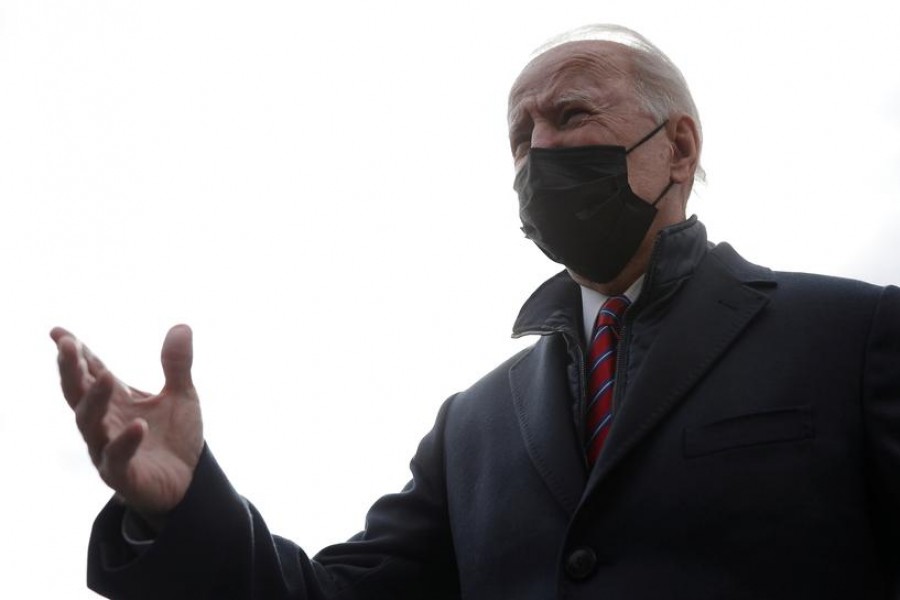US President Joe Biden on Monday threatened to reimpose sanctions on Myanmar following a coup by the country’s military leaders and called for a concerted international response to press them to relinquish power.
Biden condemned the military’s takeover from the civilian-led government on Monday and its detention of elected leader and Nobel laureate Aung San Suu Kyi as “a direct assault on the country’s transition to democracy and the rule of law.”
The crisis in Myanmar, also known as Burma, marks a first major test of Biden’s pledge to collaborate more with allies on international challenges, especially on China’s rising influence. That stance contrasts with former President Donald Trump’s often go-it-alone ‘America First’ approach.
It also represented a rare policy alignment between Biden’s fellow Democrats and top Republicans as they joined in denouncing the coup and calling for consequences.
“The international community should come together in one voice to press the Burmese military to immediately relinquish the power they have seized, release the activists and officials they have detained,” Biden said in a statement.
“The United States removed sanctions on Burma over the past decade based on progress toward democracy. The reversal of that progress will necessitate an immediate review of our sanction laws and authorities, followed by appropriate action,” he said.
Biden warned the United States was “taking note of those who stand with the people of Burma in this difficult hour.”
“We will work with our partners throughout the region and the world to support the restoration of democracy and the rule of law, as well as to hold accountable those responsible for overturning Burma’s democratic transition,” he said.
Biden called on the military in Myanmar to lift all restrictions on telecommunications and to refrain from violence against civilians.
A US official later told Reuters the administration had launched high-level internal discussions aimed at crafting a “whole of government” response and planned to consult closely with Congress.
Analysts cautioned that US leverage was limited.
Greg Poling and Simon Hudes at Washington’s Center for Strategic and International Studies said there would almost certainly be new sanctions against those involved in the coup.
“But that is unlikely to have much immediate impact on the generals,” they said, given that few of them had any intention of traveling to or doing business in the United States.
Also, unlike its reaction to a 2014 coup in Thailand, the United States cannot pull back on military exercises, training, and sales, because military-to-military relations with Myanmar remain almost non-existent, they said.
Former President Barack Obama started easing sanctions on Myanmar in 2011 after the military began loosening its grip, and in 2016 lifted many remaining restrictions. In 2019, the Trump administration imposed targeted sanctions on four military commanders, including coup leader General Min Aung Hlaing, over allegations of abuses against Rohingya Muslims and other minorities.
Suu Kyi’s National League for Democracy party won a landslide 83 per cent in a Nov 8 election. The army called its takeover a response to election fraud.
‘INTENSIVE’ CONSULTATIONS
White House spokeswoman Jen Psaki told a regular news briefing Washington had had “intensive” conversations with allies. She declined to say what other actions were under consideration aside from sanctions.
Psaki said Biden’s remark that the United States was “taking note” of how other countries respond was “a message to all countries in the region.”
The top Democrat on the Senate Foreign Relations Committee, Robert Menendez, said Washington and other countries “should impose strict economic sanctions, as well as other measures” against Myanmar’s army and the military leadership if they did not free the elected leaders and remove themselves from government.
He also charged that the Myanmar army was guilty of “genocide” against minority Rohingya Muslims - a determination yet to be stated by the US government - and of a sustained campaign of violence against other minorities.
US Senate Republican leader Mitch McConnell, who like members of the Biden administration has had close past ties with Suu Kyi, called the arrests “horrifying” and said Washington needed to “impose costs” on those behind the coup.
“The Biden Administration must take a strong stand and our partners and all democracies around the world should follow suit in condemning this authoritarian assault on democracy,” he said.
The events in Myanmar are a significant blow for the Biden administration and its effort to forge a robust Asia Pacific policy to stand up to China.
Many of Biden’s Asia policy team, including its head, Kurt Campbell, are veterans of the Obama administration, which on leaving office in 2016 hailed its work to end decades of military rule in Myanmar as a major foreign policy achievement. Biden served as Obama’s vice president.


